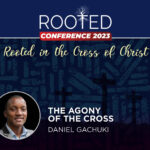Suffering is pervasive in our world. As Christians, we are never insulated from it. Afflictions, losses, persecution and oppression are just a few forms of suffering. But God loves to identify with sufferers. He is for us (Psalm 56:9; Romans 8:31). God is ever tenderly disposed towards us, not least when we’re suffering (Exodus 3:7). He has graciously given us the book of Psalms as a divine resort—a place where we can go to be strengthened against defeat, despair, denial and doubt. As we eavesdrop on the psalmists’ heartfelt transparent articulations of even the strongest feelings of anger, betrayal, heartache, hope or pain, we learn that we too can pour out our hearts to God in desperate candour. Psalm 6 illustrates this point superbly.
This psalm is stained with tears, as David pleads his misery in order to receive mercy.
It is a song of both lament and penitence. It is stained with tears. We see David giving voice to those ravaged by abuse, persecution, pain and affliction. He pleads his misery in order to receive mercy. Similarly, as we manoeuvre the deep pits of life’s misfortunes, we are enjoined to do as he does. Fellow sufferers can unburden before God by doing three things.
1. Offer Passionate Pleas for Mercy (Psalm 6:1-3)
David turns to the covenant God. One easily notices the fourfold vocative: “LORD.” Afflicted saints need not wonder where to turn to be heard. God is never repelled by our pain when voiced in faith. For he is gracious and merciful (Psalm 145:8). God responds to pleas of mercy and heals both disjointedness of “bones” and “soul” (Isaiah 19:22)—physical pain, broken hearts, or troubled consciences.
Afflicted saints need not wonder where to turn to be heard. God is never repelled by our pain.
When we suffer, we often feel like our suffering is endless. The psalmist plaintively cries “O LORD—how long?” cueing us into the appropriateness of godly lament. Intense despondency common to victims of suffering can be rightly lamented because lament is the language of the downcast as we process our pain.
2. Be Honest about Your Fears and Pain (Psalm 6:4-7)
David fears that “death” and “Sheol” are imminent. Sufferers may equally experience panic and foreboding. Pleading for deliverance is right. God’s servant says he is “weary with moaning,” revealing the exhaustion and faintness that accompanies incessant affliction (Psalm 6:6). Like David, Christians may find themselves flooding their beds with tears, drenching their couches with weeping. Your eyes may be bloodshot and puffy, but God is never indifferent to your grief. He is near to the broken-hearted (Psalm 34:18).
3. Remain Confident in God (Psalm 6:8-10)
Lastly, David says “God has heard the sound of my weeping…the Lord has heard my plea” (Psalm 6:8-9). God hearing him is the basis of David’s confidence. Just as the psalmist’s pleas yielded something, our pleas do too. Prayer is the way we get hold of God in our suffering. When you suffer, you may rest assured that God hears your prayers—the voice of your tears, even when your words fail. C. H. Spurgeon was right to quip that “weeping is the eloquence of sorrow.”
When you suffer, you may rest assured that God hears your prayers.
Consequently, the psalmist rises from distress to delight and embraces the reality of divine retribution. His enemies shall be “ashamed” and “greatly troubled” (Psalm 6:10). Likewise, whether now or hereafter, a Christian who is a victim of undeserved suffering may know that God will issue justice. Just as David’s foes would be shamed for their sin against him, God will shame our persecutors and oppressors in due time. The only escape from God’s wrath for them is repentance and a humble trust in Jesus.
In Our Despair We Can Still Hope
So we see that we too can be buoyed from hopelessness to healing by unburdening to God as a child to a father through the gracious means of biblical lament and confession of our neediness. Hard as this might sound, it is not impossible. Psalm 6 proves the truism that says: hope may despair, but despair can hope. As the Bible unfolds, we see the cross of Christ as God’s solidarity with and compassion for the assaulted. And we see the resurrection as his promise that he will heal and redeem all our suffering.
As we appropriate the grace given to us in the Psalms, may we be guided on an ascent from the valley of despair to the peak of the mount of God’s grace. And may God be praised as afflicted Christians in our continent are moved from hopelessness to hopefulness, from grief to gladness, and from hurt to healing.














